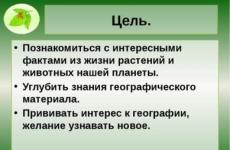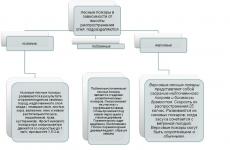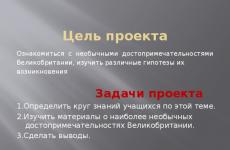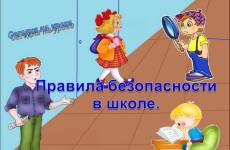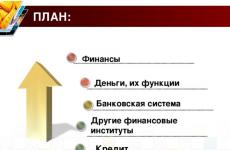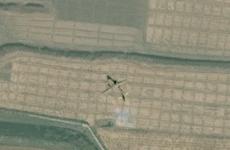Class hour "safety school". Safety - presentations on the topic of safety at school, life safety rules and safe behavior of children during the holidays, in the forest, with electrical appliances, in transport, on the road, download free safety lessons
The main task of adults is to ensure the safety of children. And it doesn’t matter at all where they will be: at school or at home, in the forest or on the road, in a car or on a train. Children receive their first safety lessons at school. Presentations on the topic of safety for children should be shown in every class so that students from grades 1 to 11 know that many emergency situations can be avoided if you know how to behave.
You have received a class and become a class teacher, which means you already need to download a presentation on the topic of safety at school, at home, on the street, in transport. For a long time, this topic was considered the most difficult when planning the educational process. Children are bored sitting at their desks and listening to safety instructions. Everything changed with the advent of IT in school life. Now the safety precautions described on the presentation slides arouse the child’s interest. He not only listens, but also remembers, takes an active part in discussing situations.
Our collection includes safety presentations for all grade levels and on any topic. For kids, you can download a presentation on the topic of safety at school, when roller skating and cycling in the form of fairy tales with pictures and music. In middle classes, presentations on the rules of safe behavior in unusual situations, when hostages are taken, in the forest would be appropriate. High school students, getting acquainted with safety rules, strive to learn something new. It's time to download presentations on safety precautions and security systems that are used in the world.
Life brings not only continuous joys. Sometimes there are so many surprises in it, but it is presentations with safety lessons that will save someone’s child’s life when trouble comes from somewhere or will prevent them from encountering this very trouble.
Do not think that ensuring children's safety is the primary task of parents. They do not have special education, and some simply do not assume that it is necessary to talk with a child about such topics. But the teacher has the opportunity to download for free from the website any presentation on the topic of safe behavior at school, electrical safety, personal safety of children and reveal to them the little secrets of preserving their own lives.
The danger must bypass the children, but it will not touch them only when its students know it by sight. Let every presentation on such a pressing topic as safety be in demand from the teacher at the beginning of the school year, and on the eve of the holidays, and on the eve of any holiday, and not only when the school reports another accident.
In addition to this section, presentations on safe behavior can be downloaded for free in the sections Traffic Rules, Fire Safety, Terrorism, Railway.
Every school should be safe. The presentation tells how to ensure safety at school for children not only in the classroom, but also in the locker room, library, cafeteria, gym, and school grounds. It is necessary to download a presentation on the topic of safety within the school walls in order to warn children about the dangers that occur due to their carelessness or carelessness.


As soon as the third quarter ends in the spring, the teacher should download a free presentation on safety rules during spring break. It can also be used at the end of the school year to provide instruction during class or life safety lessons for primary school students on the rules of safe behavior in the summer. Free presentation on safety precautions during spring and summer holidays - happy adventures for children without injuries or accidents.


Leaving a child at home alone is always scary. A presentation for children on the topic “Home Safety” contains fascinating advice from the wise Owl, who tells how to use the elevator, how to behave if a stranger rings the doorbell or telephone. A presentation for children in grades 1, 2 or preschoolers states that your safety, child, at school and at home depends on yourself.


A 16-slide presentation for children on the topic “Road Safety” talks about the dangers encountered when entering the roadway and how they can be avoided. By following all safety rules on the road, the road to school and to friends, to the store and library will be completely safe.


Joking with electricity never led to anything good. A presentation for children on the topic of electrical safety, talks about the rules for handling electrical appliances at school and at home. In addition, the presentation draws attention to the rules of conduct near transformer booths and power lines.


A presentation on the topic “Rules of Safe Behavior” will save the lives of children, the slides of which talk about safe behavior in the forest, when crossing the street, when an unfavorable environmental situation occurs in the region, or even when children are taken hostage by terrorists. These presentation slides, which can be downloaded for free, do not scare children, but teach basic safety rules in and out of school. Children's lives depend on the implementation of such rules. The presentation contains all the rules of safe behavior from A to Z.


A presentation on the topic “Safety rules for children” will warn our nimble and restless students from misfortunes on the roads and streets, and will answer the question of why it is necessary to follow safety rules on the train and in the car, as well as when roller skating. These topics excite children so much that each slide of a presentation on safety rules will cause a shout out among children and will be remembered for a long time.


The presentation “Safety Lesson” teaches children the rules of behavior in everyday life. They seem simple, but you need to know them, because they inform you about the risks that lead to tragedy. You can download a safety lesson with a presentation for elementary school, as the material is fascinating and contains many illustrations.


Safety Lesson
You should know it!
Performed
primary school teacher
MBOU secondary school No. 40 in Belgorod
Ryapolova Marina Viktorovna
Goals and objectives:
- ensuring the safety of life and vital activity of students of an educational institution;
- informing and warning about the risk and necessary safety measures;
- maintaining, strengthening and protecting the health of school students in dangerous and emergency situations;
- organizing the protection of students, developing skills and habits of safe behavior at home and at school.
Rights and obligations of citizens of the Russian Federation in the field of protection from emergency situations.
- Citizens of the Russian Federation have the right to protection of life, health and personal property in case of emergencies.
- In accordance with the law citizens of the Russian Federation have the right to be informed about the risk to which they may be exposed in everyday life and the necessary safety measures.
- Citizens of the Russian Federation have the right to compensation for damage caused to their health and property due to emergency situations.
- Necessary know and comply with laws, safety measures and a number of general rules of behavior in everyday life, helping to improve the safety of citizens.
Rules for safe behavior in life and everyday life.
- Every person should know and follow the general rules in everyday life so that emergency situations are not taken by surprise.
- Each dangerous and emergency situation has its own specifics and requires specific human actions taking into account the current situation.
How dangerous are electrical appliances?
- Under certain conditions, when using well-known equipment and devices, dangerous situations can arise for you, for your loved ones and for your home.
- In the first case, you yourself can create a dangerous situation by violating the rules for using equipment and household appliances.
- In another case, a dangerous situation may arise regardless of you: the electrical voltage in the network has sharply increased.
Rules for using electrical appliances:
- When electric current passes through the human body, it heats up and can cause burns. Electrical burns can cause serious damage to the internal tissues of the human body.
- In addition, electrical shock can cause cardiac arrest or respiratory arrest.
- do not use faulty electrical appliances, never leave a switched-on electrical appliance unattended;
- do not plug several electrical appliances into one outlet;
- follow the order of connecting an electrical appliance to the network: first connect the cord to the device, and then connect the cord to the network;
General rules for safe handling of electricity.
- turning off the device is done in the reverse order;
- do not touch the switched on electrical appliance with wet hands;
- remember: you cannot use electrical devices while in water;
- Immediately inform your parents or elders about detected malfunctions in electrical appliances, exposed or poorly insulated wires.
Remember and know!
Household gas and its properties.
- Gas used for domestic purposes can be of two types: liquefied gas in cylinders and city main gas.
- Household gas has neither color nor odor, but in order to detect its leak, special substances that have a specific odor are added to it.
Rules for safe handling of gas appliances.
A gas leak can lead to human poisoning and explosion of the premises. To prevent this, you must follow safety rules when using household gas.
Basic Rules:
- to light a gas burner, first bring a lit match, and then smoothly and carefully open the gas tap;
- do not leave switched on gas burners unattended;
- Make sure that the liquid heated on the gas stove does not flood the burner flame;
- If you notice an extinguished burner, do not try to light it again - this may lead to an explosion. Turn off the gas tap, open the windows and ventilate the kitchen properly. Report the incident to an adult.
What should you do if you smell gas?
If a source of fire is detected:
1. Don’t be afraid to call adults for help, even if you are the culprit of the fire.
2. Immediately leave the burning room, checking to see if there are anyone left in the apartment who cannot get out on their own (small children, sick old people).
3. Call the fire and rescue service of the Ministry of Emergency Situations by phone “01”. At the same time, provide the exact address, what is burning and where, your name and phone number.
Follow fire safety rules!
Rules for using the water supply system.
- Do not throw foreign objects into the drain.
- Don't clog your sink with food waste.
- When leaving home, check that all taps are closed.
- Monitor the condition of the pipes to promptly eliminate leaks.
If you find a leak:
- Immediately notify your parents at work or call your neighbors.
- Call the control room, tell us what happened, and ask them to send a specialist - a plumber.
- Turn off the electricity and turn off the water.
- Place basins, buckets, pots or other containers in places where there are leaks, quickly remove the water that has accumulated on the floor.
Rules for working with a computer:
- position yourself at the computer so that the distance to the display is at least 50 cm;
- watch your posture: do not slouch or lean too much towards the screen or keyboard;
- The duration of a student’s work at the computer should not exceed 25 minutes;
Internet safety rules:
- when you register on sites, try not to provide personal information (mobile phone number, email address, your photo);
- Unsolicited letters from strangers are called “Spam”, if you receive such a letter, do not respond to it;
- If you receive a message from an unfamiliar address, it is better not to open it, such letters may contain viruses;
- If you don't have adults around, don't meet people you met online in real life.
Use of hazardous substances and household chemicals.
Household chemicals include detergents, cleaning agents, disinfectants, household insect control and plant protection products, adhesives, and paints and varnishes.
How to avoid poisoning from household chemicals?
- Never use unfamiliar household chemicals.
- Do not drink liquids from unfamiliar bottles or cans.
- Do not use matches or open flames near jars or bottles with strong odors.
- Do not spray their contents near an open flame.
- You should not use medications whose names are unknown (tablets without packaging or in bottles with worn out labels);
- Medicines that have expired should be thrown away. You can't drink them.
What harm can medications cause?
Devices containing mercury.
- fluorescent lamps (these are gas-discharge tubes containing inert gases and mercury vapor). All such lamps contain mercury - from 40 to 70 mg;
- mercury thermometers;
- instruments for measuring pressure (pressure gauges);
All sharp, piercing and cutting objects must be put in their place. Keeping your home in order is not only for beauty, but also for safety!
What are the dangers of sharp, piercing and cutting objects?
Be careful when meeting strangers, do not open the door of your home to strangers!!!
Thank you for your attention!
Never talk to strangers. If they talk to you, then don’t agree to anything. Don’t take anything from them and don’t go anywhere under any pretext. Remember, a good adult will not ask a child for help. If they try to take you away by force, then shout “Help! This is not my dad, he wants to steal me!”; If you are being chased (by an adult or a teenager), then never run away to deserted places, on the contrary, go to the bus stop, to the store, to the post office. Ask for help from a policeman, security guard, seller, or just passers-by on the street. Always explain that these are not your parents, this is not your brother, but someone else is pursuing you; Don’t talk to drunk people, it’s better to quickly leave that place; Don’t go with strangers to deserted places; If you see a package, bag or box on the street, do not touch anything, there may be a real bomb there; Don't go for a walk without permission. If you go somewhere, always tell your parents the exact place and address. Don't go out on your own in the evening; If you are lost in a crowded place, stop and wait for your parents; if they are gone for a long time, then go and ask adults for help. Always try to contact a policeman, station duty officer, salesperson, dispatcher or security guard. Do not ask for help from suspicious adults with strange appearance and behavior;
Description of the presentation by individual slides:
1 slide
Slide description:
2 slide
Slide description:
3 slide
Slide description:
Safety of schoolchildren on the road Cross the street only at pedestrian crossings; Do not cross the street at a red light, even if there are no cars nearby; When crossing the street, first look to the left, and when you reach the middle, look to the right; Never run suddenly onto the road or play near the road; Always walk on the sidewalk, and if there is none, walk along the edge of the road towards traffic.
4 slide
Slide description:
Safety rules for children on the street Never talk to strangers. If they talk to you, then don’t agree to anything. Don’t take anything from them and don’t go anywhere under any pretext. Remember, a good adult will not ask a child for help. If they try to take you away by force, then scream; If you are being chased (by an adult or a teenager), then never run away to deserted places, on the contrary, go to the bus stop, to the store, to the post office. Ask for help from a policeman, security guard, seller, or just passers-by on the street. Always explain that these are not your parents, this is not your brother, but someone else is pursuing you; Don’t talk to drunk people, it’s better to quickly leave that place; Don’t go with strangers to deserted places; If you see a package, bag or box on the street, do not touch anything, there may be a real bomb there; Don't go for a walk without permission. If you go somewhere, always tell your parents the exact place and address. Don't go out on your own in the evening; If you are lost in a crowded place, stop and wait for your parents; if they are gone for a long time, then go and ask adults for help. Always try to contact a policeman, station duty officer, salesperson, dispatcher or security guard. Do not ask for help from suspicious adults with strange appearance and behavior;
5 slide
Slide description:
Rules for fire safety and protection from electricity Do not play around with fire. A lighter, matches, sparklers are not a toy for children; When leaving home, check and turn off electrical appliances and gas; Don't light a fire without an adult; In the village, do not use the stove yourself; Do not use electrical appliances with wet hands, and do not pull the cord when pulling the plug out of the socket. Do not use damaged electrical appliances or sparking sockets; Do not dry anything over a gas stove; Do not place foreign objects on a hot stove or on electrical appliances;
6 slide
Slide description:
Rules of conduct in case of fire A small fire can be extinguished by covering it with a blanket or other dense material. You can also pour water on it or cover it with sand. Do not pour water if there is electricity nearby; If the fire is large, you must immediately leave the room, take all children with you, call adults and call the fire department 01 (from a mobile phone, the number depends on the operator); In case of fire, do not use the elevator - it is dangerous; If you cannot escape, call for help through the window, call the fire department; Don't hide in a room, it will be difficult for firefighters to find you; If you are choking on smoke, sit on the floor where there is less smoke.
7 slide
Slide description:
Safety rules for children at home Heavy, sharp and cutting objects should always be hidden in their places. Be careful when using the knife; When leaving home, always make sure that the water is turned off; Never touch exposed live wires; Do not take medications on your own without direct instructions from an adult; Try to touch household chemicals (dishwashing detergent, washing powder, etc.) less; if any chemicals get into your eye, rinse it immediately with cool water for at least 20 minutes; If you heat your own food, be careful not to burn yourself; Always wash your hands before eating.
8 slide
Slide description:
Gas safety rules Do not leave a switched on gas stove unattended. Always turn it off after use; If there is a smell of gas in the house, immediately open the windows and doors to let the gas escape; Under no circumstances turn on the lights or fire while there is gas in the house, there may be an explosion; If you can, check the gas valve on the stove; if it is open, close it; Notify adults and gas service 04; Leave the room with a strong smell of gas until it dissipates.
Slide 9
Slide description:
Children's safety on the Internet Never share your or your parents' data (address, phone number, passwords, etc.) with anyone on the Internet. Nobody has the right to demand them from you. If anyone asks for them, call your parents or leave this site; Do not go to any real meetings with virtual friends from the Internet without your parents; instead of friends there may be bandits; Do not download any programs from the Internet yourself, they may contain viruses; If you accidentally end up on a bad site, close it immediately. There are many good sites on the Internet, use them.
10 slide
Slide description:
Personal safety of children at home Never open the door to strangers. Even if they tell you that it’s from the police or a plumber or the post office. Do not open the door to any stranger; If a stranger tries to open the door of your house, call the police immediately. As a last resort, you can open the window and call neighbors or passers-by from the street for help; When you’re at home by yourself, it’s better not to pick up the phone, but if you pick up and a strange voice asks if your parents are at home, say that they’re home, but they’re busy and can’t come over. Let the caller leave their phone number, and the parents will call back later; Do not believe that someone came to you or brought something at the request of your parents, if they themselves did not say so.
11 slide
Slide description:
Children's safety in winter Do not walk on river ice without adults, it may break; Be careful on slippery surfaces to avoid falling. Try never to fall on your back, it is better to fall forward and lean on your hands; Don’t forget to dress well and cover your ears, head and throat so as not to get frostbite or catch a cold; Walk away from the walls of houses so that snow or icicles do not fall on you from above; Do not touch the icy metal, especially with your tongue, you can freeze; Don't throw snowballs in your face, don't throw ice cubes; Skiing, skating and sledding can only be done in safe, designated areas. Don't ride near roads; Cross the road very carefully. In winter, the road is slippery and it is difficult for the car to stop.
12 slide
Slide description:
Rules of conduct in the locker room 1. When you arrive at school, be sure to change your shoes and take off your hat. 2. Hang your shoes and clothes in a certain (your) place. 3. Put mittens and gloves in your pocket, and a hat in your sleeve. 4. Hang your clothes neatly. 5. When undressing, do not talk, undress quickly, do not disturb others. 6. If you see fallen clothes, pick them up. 7.Be polite to your comrades, help others. 8. DON’T FORGET YOUR STUFF!
Target: discuss with students dangerous situations in which a child may find himself; teach how to act correctly in a dangerous situation.
Equipment: Presentation , reminders, telephone.
Form: group work.
1. Goal setting.
– Today we will spend our class hour (Slide 1) at the “Safety School” and learn (Slide 2) how to behave in dangerous situations.
-What is danger? (Slide 3)
Danger is a situation when a person is threatened by something or someone.
2. Introduction to the topic
– In the old days, when there were no textbooks, children learned how to behave in a dangerous situation from fairy tales. Let's remember some of them:
"The wolf and the seven Young goats"(Slide 4)
– Why did the kids get into trouble?
– What should have been done?
"Three piglets"(Slide 5)
– What lesson can be learned from this fairy tale?
A sweet girl was walking through the forest. (Slide 6)
Nice, kind, brave.
And towards her there is a dark personality,
Gray in every way.
- Who is that girl? Who did she meet?
Why did Little Red Riding Hood get into trouble?
Take a lesson here: (Slide 7)
And don’t talk to strangers at all.
3. Work on the topic
– Let’s remember the rules of behavior with strangers: Which ones do you know? (Slide 8)
Never talk to a stranger.
Never get into a stranger's car.
Don't play on the way home from school.
Don't play after dark.
– What can happen if you don’t follow these rules? (Slide 9)
– Now imagine what you will do if a stranger rings the doorbell of your apartment?
“Even an adult should make sure it’s not an intruder.”
- What do I need to do? (Look through the peephole or ask “Who’s there?”)
For some reason, some people are embarrassed to ask: “Who’s there?” and even look through the door peephole. And it's a shame. Because there is no point in installing locks and iron doors if you yourself open them to just anyone.
Therefore, remember the rules: (Slide 10)
But there are times when a stranger introduces himself and says that he is on behalf of his mother. Remember! Do not let strangers in under any pretext.
Well, in order not to make it easier for thieves to commit their dark deeds -
2. Do not leave the apartment key in a “safe place” (somewhere under the rug or in another secluded place).
– Why do you think this shouldn’t be done?
4. Discussion of situations in groups(Slide 11)
Target: Now we will check in practice how you will act in a given situation.
Each group is given a situation. You read it, discuss it. Let everyone express their opinion. But before making decisions in a dangerous situation, follow these steps: (Slide 12)
1. Stop
2. Think
3. Choose
4. Praise yourself
Situation 1.(Slide 13)
A friend or girlfriend has come to your house and you are watching TV together. There is no one in the apartment except you. But then your doorbell rang. Describe what you will do?
Situation 2.
You are playing outside. Suddenly, a well-dressed man approached you and offered you a ride in his car. What will you answer him?
Situation 3.
You hid the key to the apartment in a “safe place” - and quickly went outside to play. When I returned, I did not find the key in place. How will you act and what should adults do after this?
Situation 4.
Mom and dad are at work, and you are alone in the house. Doorbell. You looked through the peephole and asked: “Who’s there?” The man introduced himself as a family friend and said that he forgot an umbrella at your house, asking for it back. Your actions?
Conclusion(slide 14)
1. Only someone you know well can open the door.
2. Don’t leave your apartment key in a “safe place”
3. And if you have lost your key, tell your parents immediately.
4. Never brag about new things or your family’s wealth, either in the yard or at school.
5. You and the phone.(Slide 15)
- Let's talk about whether you know how to talk on the phone if adults are not at home. It's very easy to talk on the phone, everyone knows that. But here there is an important rule: you should only talk to someone you know. And whoever you don’t know, apologize, say goodbye and hang up. No matter who the person calling is, remember: (Slide 16)
1. Do not give the address or apartment number.
2. Never give out your phone number.
3. Don't engage in conversations with strangers.
– And now we will conduct a master class on how to talk on the phone correctly (two students act out a conversation on the phone). (Appendix, slide 17)
1st conversation
- Hello.
- Who is speaking?
- Who do you need?
2nd conversation
– What kind of apartment is this?
- This is my apartment. Which one do you need?
3rd conversation
- What number is this?
- Tell me which one you need. I'll tell you this one or not.
4th conversation
– Are there any adults at home?
- No one can come near now. Call back later.
5th conversation
- A police officer will come now, open the door for him.
- I can not open. Reach out to your neighbors.
A telephone (slide 18) is a good thing if you know how to use it. And if you are left alone in the house, a phone is simply necessary. You can always call and ask your grandmother, mother, father about something, call neighbors or the police for help. Or maybe even call the fire department. But to do this you need to know the numbers:
If we call 01, we will get to... (slide 19)
You can't handle the fire on your own.
This work is not for children.
Without wasting time,
“01” call quickly.
If we call 02, we will get to... (slide 20)
I was left alone at home.
Someone tried to open the door
I then dialed “02”
And he called the police.
If we call 03, we will get to... (slide 21)
If mom gets sick,
Don't worry and don't cry.
Dial "03" quickly
And the doctor will come to mom.
If anything happens
The ambulance will come.
If we call 04, we will get to... (slide 22)
If you come from a walk,
He took off his hat and suddenly in the apartment
I noticed the smell of gas
Dial 04 –
And they will help you right away.
6. Summary
– Our lesson at the “Security School” is over. We learned about some rules of behavior that will help you avoid dangerous situations. (Slide 23). Dangerous situations can be prevented! I hope this lesson will be of benefit to you. And now you can sum it up yourself, continuing my phrases with rhyme:
If we are called to swim, to appear on TV, (Slide 24)
They promise to give you candy, answer firmly... (No).
If you are on the phone
Someone unknown is calling...
Having listened silently, restrain yourself,
Having said goodbye... (apologize).
Of course, this happens in fairy tales (Slide 25)
That everything ends well for them,
And so that we can live in peace,
With safety rules you need... (be friends)

